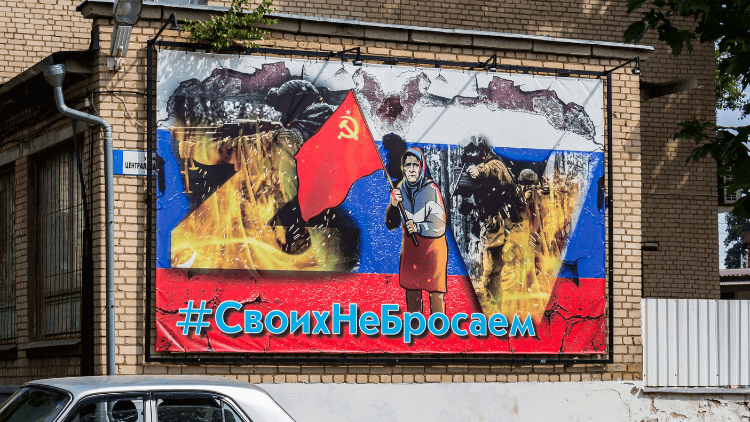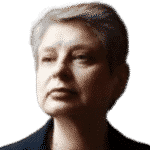Ordinary Russians are unable to protest against the Ukraine war. But evidence of covert resistance is everywhere.

During World War II, the iconic American film director Frank Capra created a documentary series entitled Why We Fight. Originally produced by the United States Department of War as a training film, the theatrical release was meant to convince Americans that the coalition against Adolf Hitler warranted their support and that the defeat of the Nazis directly served American interests. The project was a success, though it is impossible to measure the film’s impact precisely. In the Soviet Union, another major party to the fight, the public needed no such convincing, as the battle for survival was happening on their own territory.
That is not the case with Russia’s war against Ukraine. The Kremlin certainly wants to portray its ‘special military operation’ as a patriotic endeavour. But far from chanting the World War II slogan, ‘Our fight is just; victory will be ours’, many Russians are wondering why they are fighting at all.
Voting with their feet
In a January poll, some 25 per cent of respondents—and over 60 per cent of city-dwellers and younger people—reported that they did not support the war. Only 27 per cent of young people surveyed voiced their support. This is notable in a country where expressing doubts about the government’s actions can land you on a ‘foreign agents’ list, or worse.
Many other Russians have voted with their feet: more than 500,000 have left the country since Russia’s full-scale invasion of Ukraine, and those who have stayed are deeply worried about their future. According to a recent Gallup-Romir poll, 48 per cent of Russians report experiencing significant financial uncertainty—the highest rate in the 56 countries covered. Even among the 45 per cent of Russians who say they support the war unequivocally, only 25 per cent do so actively, such as by volunteering or providing financial assistance.
None of this is good news for the Kremlin, which has been trying desperately to push its war narrative. The campaign, the Russian president, Vladimir Putin, declares, aims not only to ‘demilitarise’ and ‘denazify’ Ukraine but also to prevent the west from succeeding in its purported mission to destroy Russia. What is at stake, according to the Kremlin’s propaganda, is nothing less than ‘the survival of Russian statehood’ and the future of its young people. Furthermore, Russia’s latest foreign-policy doctrine asserts that the country is fulfilling its ‘unique historic mission’ to ‘maintain a global balance of power’ and ‘build a multipolar’ world order.
Smacked over the head
That is propaganda worthy of the Great Patriotic War, as Russians call World War II, and the public is being smacked over the head with it. Television is dominated by war narratives. Billboards celebrating Russian war heroes and advertising tank shows line Moscow’s streets. ‘Victory will be ours,’ they declare in true WWII style, though they leave out the first part of the classic slogan.
As shocking as the war has been for the west, its impact there cannot compare to how it has upended Russian life. The war has meant a sudden, forcible and bewildering transformation of Russia’s economy and society.
European civilisation, in particular, has always been part of Russia’s cultural code, despite lengthy periods of confrontation with the west. But, according to Putin, Russia is now a ‘self-sufficient state-civilisation’ and European culture is slowly being eliminated from Russian theatres and museums, if not from restaurants and cafes (which are still French and Italian). For example, the 19th-century play Cyrano de Bergerac, by Edmond Rostand, has been removed from the repertoire of Saint Petersburg’s Alexandrinsky Theatre for supposedly discrediting the Russian armed forces.
Big Brother
Such cultural bans are of course not the only way ordinary Russians are being made to feel Big Brother breathing down their necks. Since the ‘partial mobilisation’ announced last September, a police officer has been stationed at every metro turnstile in Moscow. It is tough to pretend that nothing has fundamentally changed when mere entrance to public transport is controlled by a heavily armed man.
All of this has made it increasingly difficult for Russians to go about their lives. In the early months of the war, conversations may have been dominated by the events in Ukraine but it still felt natural to go to work or have dinner with friends. As war propaganda has grown louder and more insistent, ordinary life has moved into the background.
The Ukraine war is now at the forefront of Russians’ minds—though not in the way the Kremlin wants. Rather than fight for Putin’s ‘patriotic’ cause, Russians are resisting it. While they are unable to protest en masse, let alone drive Putin from the Kremlin in one fell swoop, evidence of the covert fight of the ‘silent majority’ is everywhere.
Peredelkino, a village less than 20 miles (32 kilometres) from Moscow, is known for its wooded terrain, through which Soviet writers, including Boris Pasternak, often ambled. Now, the high-profile oligarch and Putin ally Roman Abramovich, who is rumoured to oppose the war, owns much of that terrain. And ‘no to war’ carvings mark the tree stumps that line the forest paths.
An Orwellian mug
At a bookstore on Saint Petersburg’s central Nevsky Prospect, a display of patriotic books on Russia was adorned by a mug emblazoned with an image of George Orwell and the caption ‘Let Big Brother think that there is tea in this mug’. Inspired by the brave arranger of this display, I bought that mug, which, I discovered the following day, was replaced with another. This one displayed a quote from Orwell’s masterpiece 1984: ‘If you are in a minority, and even alone, this does not mean you are crazy.’
This is how we fight. As in WWII, no one has to tell us why.
Republication forbidden—copyright Project Syndicate 2023, ‘How Russians fight’
Nina L Khrushcheva is professor of international affairs at the New School in New York and co-author of In Putin’s Footsteps: Searching for the Soul of an Empire Across Russia’s Eleven Time Zones (St Martin's Press).
